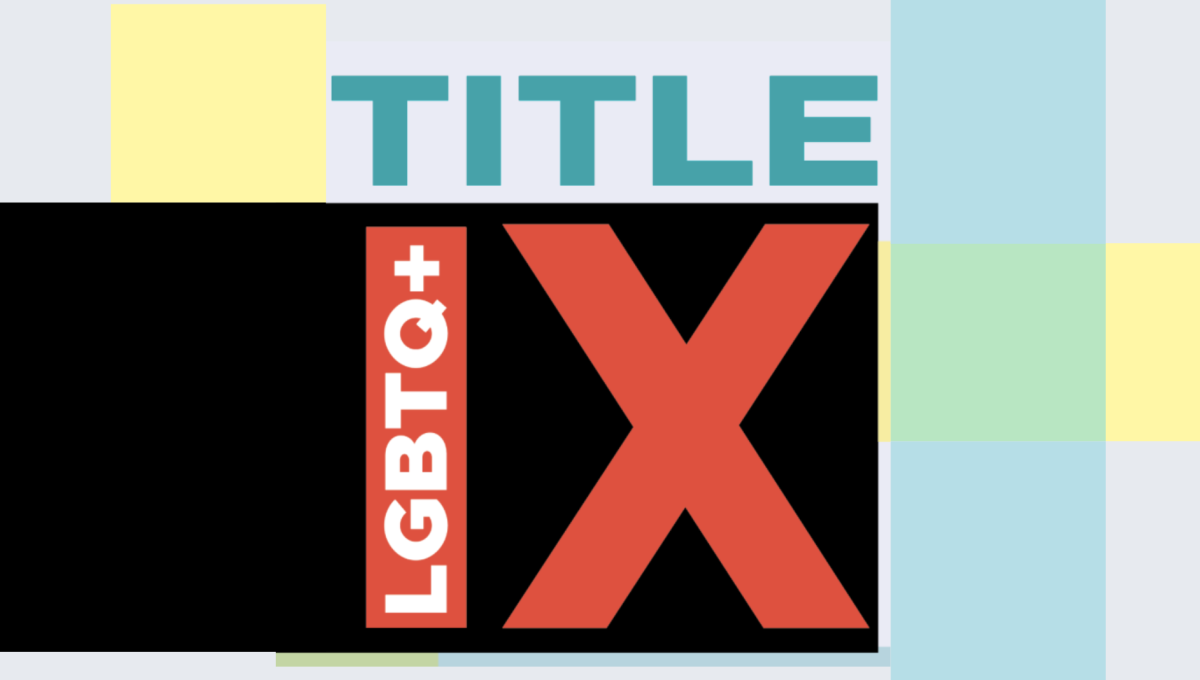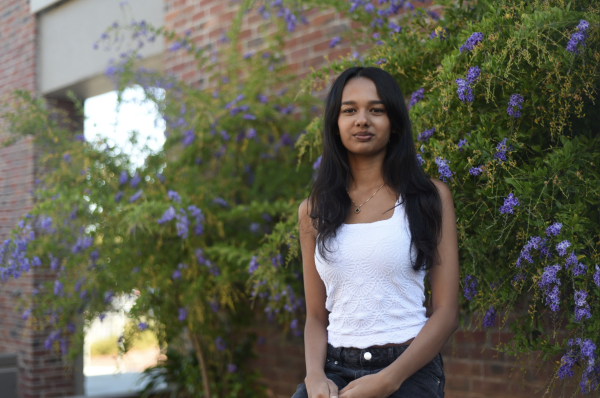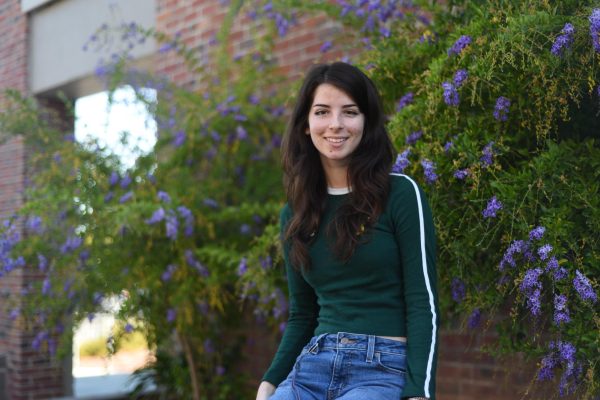The U.S. Department of Education announced Jan. 31 that it would be reversing Biden-era Title IX changes, ending federally mandated nondiscrimination protection based on sexual orientation and gender identity and protections for student survivors of sexual assault and harassment. The Biden-era Title IX, finalized in April, has been reverted to the version that was implemented in 2020 during Trump’s first presidency. The ED’s decision comes after 16 Republican-led states sued the Biden administration over the Title IX protections for transgender students, with a Kentucky judge ruling the 2024 version unconstitutional on Jan. 9, 2025.
The court claimed that the 2024 ruling had violated the First Amendment, as educators and staff would use students’ chosen names and pronouns while investigating rather than their legal names. In addition, the court believed that the changes had surpassed the authority of the ED due to the specification that “discrimination on the basis of sex” included genders that weren’t specifically male or female. The 2020 Title IX Rule includes “the interpretation of ‘sex’ to mean the objective, immutable characteristic of being born male or female.” In response to the ED’s change, California State Superintendent of Public Instruction Tony Thurmond reaffirmed that California would continue to investigate the discrimination of students based on sexual orientation and gender identity and will remain uninfluenced by the federal change.
FUHSD Associate Superintendent and Title IX Coordinator Trudy Gross also assures that LGBTQ+ students will continue to be protected in the district. She explains that despite the change in Title IX, the process of reporting issues like gender discrimination and sexual harassment, which includes talking to the school sites about the alleged issue in order to investigate the situation, remains the same. According to Gross, FUHSD school sites are concerned with discrimination and harassment in general, instead of specifically gender or sexuality-based harassment. Due to this consistency, Gross believes that the FUHSD community will be more worried about the lack of LGBTQ+ representation as a whole, rather than the process of reporting discrimination.
“The biggest shift that I’m hearing regarding 2024 is people being concerned about this idea of defining gender as male and female, and coupled with the fact that the federal government has removed words like lesbian, gay and transgender from websites,” Gross said. “What I’m hearing from students and other people is the worry about not being represented, not a concern about the sexual harassment process.
English teacher Randy Holaday is worried about the implications of the reversal along with other anti-LGBTQ+ legislation put in place since the beginning of Trump’s presidency, which mark a shift towards increased homophobia and intolerance. He recognizes that California and FUHSD are safer and more accepting of LGBTQ+ students than the rest of America, but believes there is still social stigma, citing instances of anti-gay vandalism in MVHS bathrooms and historical backlash against English class reading materials, such as the novel “Aristotle and Dante Discover the Secrets of the Universe,” studied in freshman literature classes. Holaday disagrees with the reversal, arguing it makes an already vulnerable group of young people at higher risk for sexual harassment and suicide.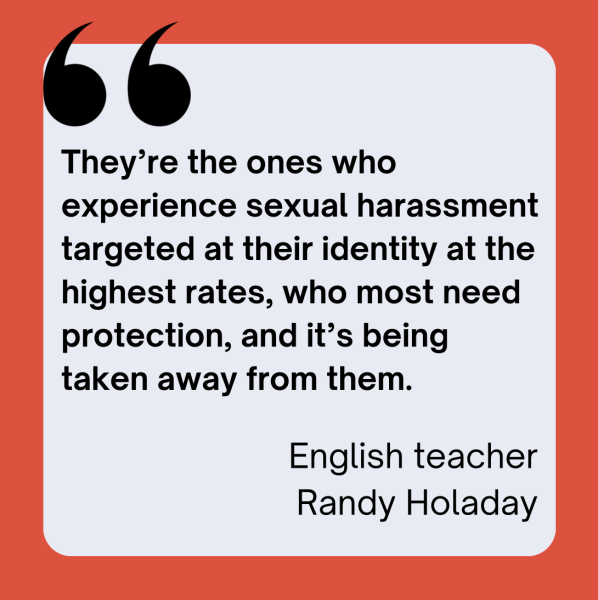
“It’s horrifying,” Holaday said. “Getting teenagers to talk is one of the hardest things that you can ever do, and LGBTQ students in particular are statistically the students that need to know that they have adults that will listen and protect them. The statistics show that this population is for students that are most likely to commit suicide and deal with depression and homelessness. They’re the ones who experience sexual harassment targeted at their identity at the highest rates, who most need protection, and it’s being taken away from them.”
According to Holaday, the culture of his own private California high school was very homophobic, with students of the same sex being unable to go to prom together and anti-gay slurs being used regularly. While he’s noticed a large shift towards acceptance, he worries that recent laws, including the Title IX reversal, will lead to more prevalent prejudice against minority groups.
“It’s hard, because I feel like it’s a move towards extreme viewpoints, regardless of what they are,” Holaday said. “People who have hateful ideologies feel more emboldened to say them. They’re definitely more visible, which probably makes it seem like it’s increasing, even if it’s the same, just louder. 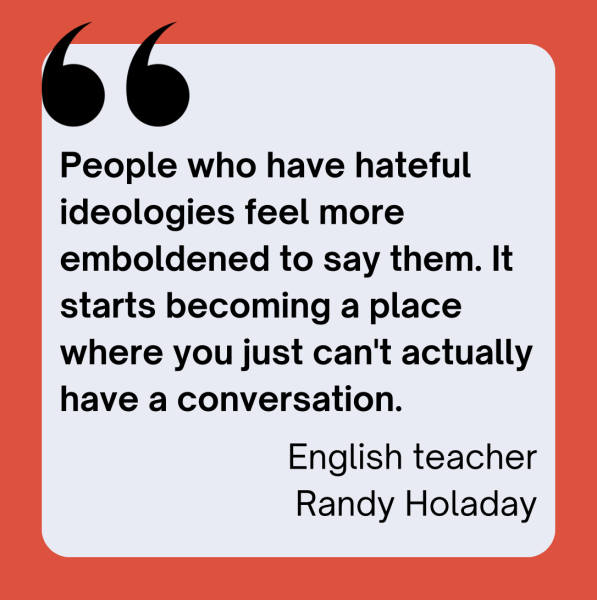
Senior and Chinese Club president Jerry Wang is also concerned about the grand-scale implications of the reversal and believes that not only the LGBTQ+ community, but other minorities, will also experience increased discrimination due to the recent rulings. Holaday agrees, explaining that society has to work harder to establish equality since it has now become a fight against the government.
“These laws take the wind out of the sails for people that were trying to prevent this,” Holaday said. “Because we’re in California, we can still respond to it, but I think we’re gonna have to respond a lot more. And they take away some of the power that came from the backing of the national government, because this is now something the government believes in and emboldens.”
According to Wang, MVHS doesn’t feel unified, as people seem too fixated on labels related to identity, such as ethnicity or sexual orientation, rather than character and who they are at heart. He thinks that, along with establishing more opportunities dedicated to bringing people together and focusing on the positives, one way students can practice tolerance and learn about diverse communities is by joining cultural clubs or the Gender-Sexuality Alliance. He believes that learning from communities with members from various backgrounds creates a more inclusive and aware society.
Gross, along with the school faculty, also aims to foster a feeling of togetherness and belonging within the community, especially to help minorities like these feel included and safe. After the surge of ICE raids, FUHSD sent out an email to assure all families, including immigrants, that they remain safe in this community and the district is considering sending a similar message for the recent increase in national discrimination against the LGBTQ+ community, to ensure that students of all minorities know they are safe.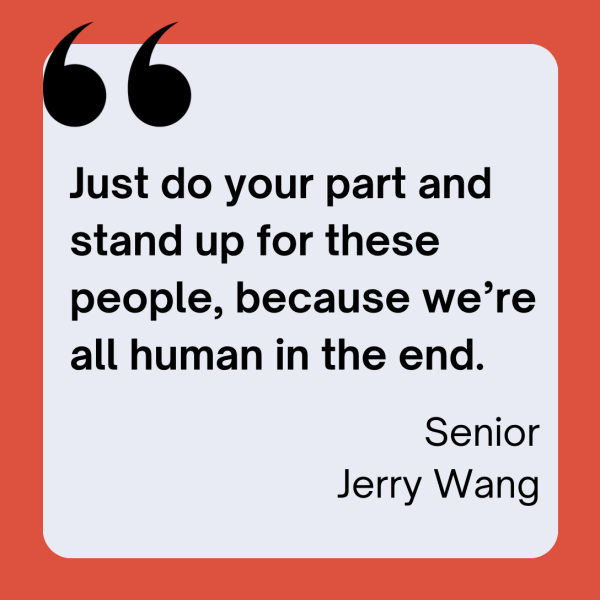
“We’re looking at what we might do again to reinforce and send that message that you are valued here in our schools,” Gross said. “School is obviously our concern, but school is a microcosm of the community of the society that we live in.”
Wang recognizes that California as a whole tends to have more non-discrimination laws and acceptance of different minorities, such as cultural groups and the LGBTQ+ community. For example, California has strong employment nondiscrimination laws and protects Native American cultural artifacts. Still, he believes that MVHS has the obligation to continue to advocate for rights and inclusivity, as a majority of the nation’s youth, especially in predominantly Republican states, are significantly impacted by laws like these.
“There needs to be more activism and advocacy for these protections, and just standing up for these communities,” Wang said. “Whatever it takes really, like going to protests or putting your opinion out there. Just do your part and stand up for these people, because we’re all human in the end.”




